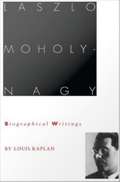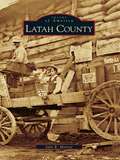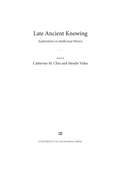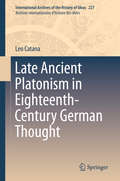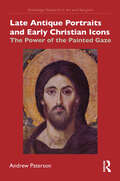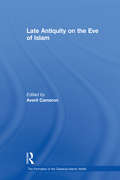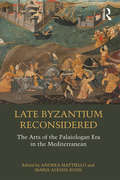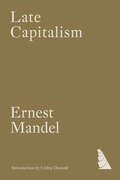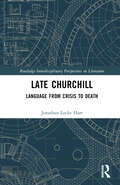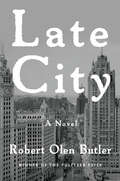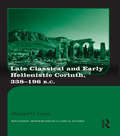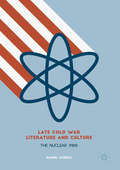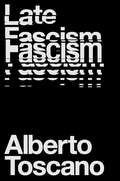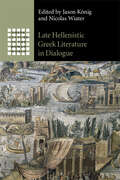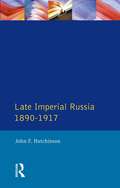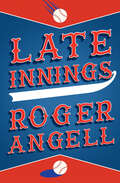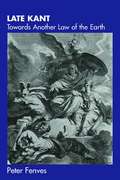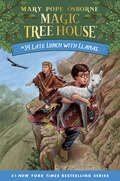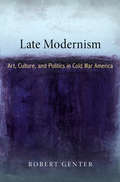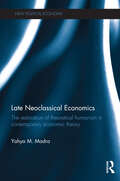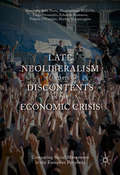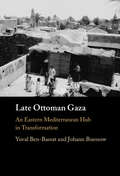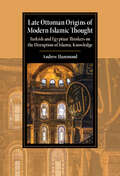- Table View
- List View
Laszlo Moholy-Nagy: Biographical Writings
by Louis KaplanMarking the centenary of the birth of Laszlo Moholy-Nagy (1895-1946), this book offers a new approach to the Bauhaus artist and theorist's multifaceted life and work--an approach that redefines the very idea of biographical writing. In Laszlo Moholy-Nagy, Louis Kaplan applies the Derridean deconstructivist model of the "signature effect" to an intellectual biography of a Constructivist artist. Inhabiting the borderline between life and work, the book demonstrates how the signature inscribed by "Moholy" operates in a double space, interweaving signified object and signifying matter, autobiography and auto-graphy. Through interpretative readings of over twenty key artistic and photographic works, Kaplan graphically illustrates Moholy's signature effect in action. He shows how this effect plays itself out in the complex of relations between artistic originality and plagiarism, between authorial identity and anonymity, as well as in the problematic status of the work of art in the age of technical reproduction. In this way, the book reveals how Moholy's artistic practice anticipates many of the issues of postmodernist debate and thus has particular relevance today. Consequently, Kaplan clarifies the relationship between avant-garde Constructivism and contemporary deconstruction. This new and innovative configuration of biography catalyzed by the life writing of Moholy-Nagy will be of critical interest to artists and writers, literary theorists, and art historians.
Latah County (Images of America)
by Julie R. MonroeIts name derived from the Nez Perce language, Latah County is the only county in the United States to have been created by an Act of Congress. The abundance of its natural resources--from blue fields of camas to deep veins of gold, from great stands of white pine trees to vast green grasslands--attracted a diversity of dreamers seeking only the opportunity to build their own futures. Nestled in the heart of the Palouse, an agricultural area of extraordinary production, Latah County is a land of timber and, at Potlatch, was once the site of one of the largest sawmills in the world. At Moscow, it is also the home of the state's land-grant institution, the University of Idaho. From the forests of Troy and the ridges of Juliaetta and Kendrick, from the homesteads of Genesee to Bovill's hunting lodge and Deary's town site, Latah County has had a rich and varied history.
Late Ancient Knowing
by Catherine M. Chin Moulie VidasIn this collection of essays, scholars from a range of disciplines explore the activity of knowing in late antiquity by focusing on thirteen major concepts from the intellectual, social, political, and cultural history of the period. They ask two questions about each of these concepts: what did late ancient people know about them, and how was that knowledge expressed in people's actions? Late Ancient Knowing integrates intellectual history, post-structuralist literary theory, and recent trends in cognitive science to examine the ways that historical thought-worlds both shaped individual lives and were in turn shaped by the actions of individuals. Each chapter treats its main concept as a problem both of knowledge and of practice or behavior. The result is a richly imagined description of how people of this time understood and navigated their world, from travel through the countryside and encounters with demons to philosophical medicine and the etiquette of imperial courts.
Late Ancient Platonism in Eighteenth-Century German Thought (International Archives of the History of Ideas Archives internationales d'histoire des idées #227)
by Leo CatanaThis work synthesizes work previously published in leading journals in the field into a coherent narrative that has a distinctive focus on Germany while also being aware of a broader European dimension. It argues that the German Lutheran Christoph August Heumann (1681-1764) marginalized the biographical approach to past philosophy and paved the way for the German Lutheran Johann Jacob Brucker’s (1696-1770) influential method for the writing of past philosophy, centred on depersonalised and abstract systems of philosophy. The work offers an authoritative and engaging account of how late ancient Platonism, Plotinus in particular, was interpreted in eighteenth-century Germany according to these new precepts. Moreover, it reveals the Lutheran religious assumptions of this new approach to past philosophy, which underpinned the works of Heumann and Brucker, but also influential reviews that rejected the English Plato translator Thomas Taylor (1758-1835) and his understanding and evaluation of late ancient Platonism.
Late Antique Portraits and Early Christian Icons: The Power of the Painted Gaze (Routledge Research in Art and Religion)
by Andrew PatersonThis book focuses on the earliest surviving Christian icons, dated to the sixth and seventh centuries, which bear many resemblances to three other well-established genres of ‘sacred portrait’ also produced during late antiquity, namely Roman imperial portraiture, Graeco-Egyptian funerary portraiture and panel paintings depicting non-Christian deities. Andrew Paterson addresses two fundamental questions about devotional portraiture – both Christian and non-Christian – in the late antique period. Firstly, how did artists visualise and construct these images of divine or sanctified figures? And secondly, how did their intended viewers look at, respond to, and even interact with these images? Paterson argues that a key factor of many of these portrait images is the emphasis given to the depicted gaze, which invites an intensified form of personal encounter with the portrait’s subject. The book will be of interest to scholars working in art history, theology, religion and classical studies.
Late Antique Portraits and Early Christian Icons: The Power of the Painted Gaze (Routledge Research in Art and Religion)
by Andrew PatersonThis book focuses on the earliest surviving Christian icons, dated to the sixth and seventh centuries, which bear many resemblances to three other well-established genres of ‘sacred portrait’ also produced during late antiquity, namely Roman imperial portraiture, Graeco-Egyptian funerary portraiture and panel paintings depicting non-Christian deities.Andrew Paterson addresses two fundamental questions about devotional portraiture – both Christian and non-Christian – in the late antique period. Firstly, how did artists visualise and construct these images of divine or sanctified figures? And secondly, how did their intended viewers look at, respond to, and even interact with these images? Paterson argues that a key factor of many of these portrait images is the emphasis given to the depicted gaze, which invites an intensified form of personal encounter with the portrait’s subject.The book will be of interest to scholars working in art history, theology, religion and classical studies.
Late Antiquity on the Eve of Islam (The Formation of the Classical Islamic World)
by Averil CameronThis volume reflects the huge upsurge of interest in the Near East and early Islam currently taking place among historians of late antiquity. At the same time, Islamicists and Qur'anic scholars are also increasingly seeking to place the life of Muhammad and the Qur'an in a late antique background. Averil Cameron, herself one of the leading scholars of late antiquity and Byzantium, has chosen eleven key articles that together give a rounded picture of the most important trends in late antique scholarship over the last decades, and provide a coherent context for the emergence of the new religion. A substantial introduction, with a detailed bibliography, surveys the present state of the field, as well as discussing some recent themes in Qur'anic and early Islamic scholarship from the point of view of a late antique historian. The volume also provides an invaluable introduction to recent scholarship, making clear the ferment of religious change that was taking place across the Near East before, during and after the lifetime of Muhammad. It will be essential reading for Islamicists and late antique students and scholars alike.
Late Byzantium Reconsidered: The Arts of the Palaiologan Era in the Mediterranean
by Andrea Mattiello Maria Alessia RossiLate Byzantium Reconsidered offers a unique collection of essays analysing the artistic achievements of Mediterranean centres linked to the Byzantine Empire between 1261, when the Palaiologan dynasty re-conquered Constantinople, and the decades after 1453, when the Ottomans took the city, marking the end of the Empire. These centuries were characterised by the rising of socio-political elites, in regions such as Crete, Italy, Laconia, Serbia, and Trebizond, that, while sharing cultural and artistic values influenced by the Byzantine Empire, were also developing innovative and original visual and cultural standards. The comparative and interdisciplinary framework offered by this volume aims to challenge established ideas concerning the late Byzantine period such as decline, renewal, and innovation. By examining specific case studies of cultural production from within and outside Byzantium, the chapters in this volume highlight the intrinsic innovative nature of the socio-cultural identities active in the late medieval and early modern Mediterranean vis-à-vis the rhetorical assumption of the cultural contraction of the Byzantine Empire.
Late Capitalism
by Ernest MandelLate Capitalism is the first major synthesis to have been produced by the contemporary revival of Marxist economics. It represents, in fact, the only systematic attempt so far ever made to combine the general theory of the "laws of motion" of the capitalist mode of production developed by Marx, with the concrete history of capitalism in the twentieth century.Mandel's book starts with a challenging discussion of the appropriate methods for studying the capitalist economies. He seeks to show why the classical approaches of Luxemburg, Bukharin, Bauer and Grossman failed to accomplish the further development of Marxist theory whose urgency became evident after Marx&’s death. He then sketches the structure of the world market and the variant types of surplus-profit that have characterized its successive stages. On these foundations Late Capitalism proceeds to advance an extremely bold schema of the "long waves" of expansion and contraction in the history of capitalism, from the Napoleonic Wars to the present. Mandel criticizes and refines Kondratieff&’s famous use of the notion.Mandel&’s book surveys in turn the main economic characteristics of late capitalism as it has emerged in the contemporary period. The last expansionary long wave, it argues, started with the victory of fascism on the European continent and the advent of the war economies in the US and UK during the 1940s, and produced the record world boom of 1947-72. Mandel discusses the reasons why the dynamic upswing of growth in this period was bound to reach its limits at the turn of the 1970s, and why a long wave of economic stagnation and intensified class struggle has set in today.Late Capitalism is a landmark in Marxist economic literature. Specifically designed to explain the international recession of the 1970s, it is a central guide to understanding the nature of the world economic crisis today.
Late Churchill: Language from Crisis to Death (Routledge Interdisciplinary Perspectives on Literature)
by Jonathan Locke HartThis book focuses on a close analysis of selected speeches of Winston Churchill in the House of Commons and some of the responses from fellow MPs from the middle of 1940 to the death of Churchill in 1965, speeches in war and peace, and concentrates on foreign affairs. The book will appeal to those interested in Churchill, freedom, tyranny, diplomacy, war and conflict, democracy, politics, the Second World War, the Cold War, Britain, Canada, the United States, the British Empire and Commonwealth, Europe, France, Asia, Germany, Japan, totalitarianism, Parliament, legislative assemblies, rhetoric, language, style, speech-writing, oral and written communication, literature, history and other areas. The debate between autocracy (tyranny, totalitarianism) and democracy is in those times and ours, with many parallels, chilling. Churchill was key to our world history and is a key to understanding what is at stake in the world now.
Late City: A Novel
by Robert Olen ButlerThe Pulitzer Prize–winning author shares an “exceptionally nuanced, tender, funny, tragic, and utterly transfixing portrait” of one man’s troubled century (Booklist, starred review).At 115 years old, former newspaperman Sam Cunningham is also the last surviving veteran of World War I. As he prepares to die in a Chicago nursing home, the results of the 2016 presidential election come in—and he finds himself in a wide-ranging conversation with a surprising God. As the two review Sam’s life, the grand epic of the twentieth century comes sharply into focus.Sam grows up in Louisiana under the flawed morality of an abusive father. Eager to escape, Sam enlists in the army while still underage. Though the hardness his father instilled in him helps him make it out of World War I alive, it also prevents him from contending with the emotional wounds of war. Back in the United States, Sam moves to Chicago to begin a career as a newspaperman that will bring him close to the major historical turns of the twentieth century. There he meets his wife and has a son, whose fate counters Sam’s at almost every turn.As he contemplates his relationships—with his parents, his brothers in arms, his wife, his editor, and most importantly, his son—Sam is amazed at what he still has left to learn about himself after all these years.
Late Classical and Early Hellenistic Corinth: 338-196 BC (Routledge Monographs in Classical Studies)
by Michael D. DixonLate Classical and Early Hellenistic Corinth, 338-196 B.C. challenges the perception that the Macedonians' advent and continued presence in Corinth amounted to a loss of significance and autonomy. Immediately after Chaironeia, Philip II and his son Alexander III established close relations with Corinth and certain leading citizens on the basis of goodwill (eunoia). Mutual benefits and respect characterized their discourse throughout the remainder of the early Hellenistic period; this was neither a period of domination or decline, nor one in which the Macedonians deprived Corinthians of their autonomy. Instead, Corinth flourished while the Macedonians possessed the city. It was the site of a vast building program, much of which must be construed as the direct result of Macedonian patronage, evidence suggests strongly that those Corinthians who supported the Macedonians enjoyed great prosperity under them. Corinth's strategic location made it an integral part of the Macedonians' strategy to establish and maintain hegemony over the mainland Greek peninsula after Philip II's victory at Chaironeia. The Macedonian dynasts and kings who later possessed Corinth also valued its strategic position, and they regarded it as an essential component in their efforts to claim legitimacy due to its association with the Argead kings, Philip II and Alexander III the Great, and the League of Corinth they established. This study explicates the nature of the relationship between Corinthians and Macedonians that developed in the aftermath of Chaironeia, through the defeat at the battle of Kynoskephalai and the declaration of Greek Freedom at Isthmia in 196 B.C. Late Classical and Early Hellenistic Corinth is not simply the history of a single polis; it draws upon the extant literary, epigraphic, prosopographic, topographic, numismatic, architectural, and archaeological evidence to place Corinth within broader Hellenistic world. This volume, the full first treatment of the city in this period, contributes significantly to the growing body of scholarly literature focusing on the Hellenistic world and is a crucial resource for specialists in late Classical and early Hellenistic history.
Late Cold War Literature and Culture
by Daniel CordleThis book analyses the 1980s as a nuclear decade, focusing on British and United States fiction. Ranging across genres including literary fiction, science fiction, post-apocalyptic fiction, graphic novels, children's and young adult literature, thrillers and horror, it shows how pressing nuclear issues were, particularly the possibility of nuclear war, and how deeply they penetrated the culture. It is innovative for its discussion of a "nuclear transatlantic," placing British and American texts in dialogue with one another, for its identification of a vibrant young adult fiction that resonates with more conventionally studied literatures of the period and for its analysis of a "politics of vulnerability" animating nuclear debates. Placing nuclear literature in social and historical contexts, it shows how novels and short stories responded not only to nuclear fears, but also crystallised contemporary debates about issues of gender, the environment, society and the economy.
Late Fascism: Race, Capitalism and the Politics of Crisis
by Alberto ToscanoHow do we understand the return of fascism today?In a world shaken by ecological, economic and political crises, the forces of authoritarianism and reaction seem to have the upper hand. How should we name, map and respond to this state of affairs?Late Fascism turns to theories of fascism produced in the past century, testing their capacity to illuminate our moment and challenging many of the commonplaces that debate on this extremely charged term devolves into. It can be tempting for any contemporary assessment of fascism to reach for historical analogy. Fascism is defined by returns and repetitions, but it is not best approached in terms of steps and checklists dictated by a selective reading of Italian Fascism or National Socialism.Rather than treating fascism as an unrepeatable phenomenon or identifying it with a settled configuration of European parties, regimes, and ideologies, Toscano approaches fascism as a problem and a process, one that is intimately linked to capitalism's demands for domination. Drawing especially on Black radical and anti-colonial theories of racial fascism, Late Fascism makes clear the limits of identifying fascism simply with the political violence of bygone European regimes. Developing anti-fascist theory is a vital and urgent task. From the "Great Replacement" to campaigns against critical race theory and "gender ideology", today's global far-right is launching lethal panics about the threats to traditional political, sexual and racial regimes. Late Fascism allows us to rediscover some truly inspiring anti-fascist thinkers, rooted in their turn in largely anonymous collective practices of worldmaking against domination, traditions of the oppressed that remain a resource for those set on dismantling the hierarchies and segregations that the partisans of Order and Tradition seek to revive and reimpose.
Late Hellenistic Greek Literature in Dialogue (Greek Culture in the Roman World)
by Jason König Nicolas WiaterLate Hellenistic Greek literature, both prose and poetry, stands out for its richness and diversity. Recent work has tended to take an author-by-author approach that underestimates the interconnectedness of the literary culture of the period. The chapters assembled here set out to change that by offering new readings of a wide range of late Hellenistic texts and genres, including historiography, geography, rhetoric and philosophy, together with many verse texts and inscriptions. In the process, they offer new insights into the various ways in which late Hellenistic literature engaged with its social, cultural and political contexts, while interrogating and revising some of the standard narratives of the relationship between late Hellenistic and imperial Greek literary culture, which are too often studied in isolation from each other. As a whole the book prompts us to rethink the place of late Hellenistic literature within the wider landscape of Greek and Roman literary history.
Late Imperial Russia, 1890-1917 (Seminar Studies)
by John F. HutchinsonThis new interpretation of the final years of Imperial Russia provides a clear and concise introduction to a critical period in the history of modern Russia. Professor Hutchinson outlines the key problems facing the Tsarist regime, and the attitudes of its Liberal critics and revolutionary enemies. In particular, he considers how the monarchy was able to withstand the uprisings of 1904-06, but failed in 1917. This important new study provides an analysis of social, as well as political developments, and concludes with a brief historiographical essay which draws together alternative interpretations of the final years of the Tsars.
Late Innings
by Roger AngellThe acclaimed New Yorker sportswriter examines the inner working of professional baseball, in these essays from the spring of 1977 to the summer of 1981.Late Innings takes fans far beyond the stadium view of the field and into the substrata of baseball as it is experienced by the people who make it happen. Celebrated as one of the game&’s finest chroniclers, Roger Angell shares his commentary on the money, fame, power, traditions, and social aspects of baseball during the late seventies and early eighties. Covering monumental events such as Reggie Jackson&’s three World Series home runs and the bitter ordeal of the 1981 players&’ strike, Angell offers a timeless perspective on the world of baseball to be enjoyed by fans of all ages.
Late Kant: Towards Another Law of the Earth
by Peter FenvesImmanuel Kant spent many of his younger years working on what are generally considered his masterpieces: the three Critiques. But his work did not stop there: in later life he began to reconsider subjects such as anthropology, and topics including colonialism, race and peace. In Late Kant, Peter Fenves becomes one of the first to thoroughly explore Kant's later writings and give them the detailed scholarly attention they deserve. In his opening chapters, Fenves examines in detail the various essays in which Kant invents, formulates and complicates the thesis of 'radical evil' - a thesis which serves as the point of departure for all his later writings. Late Kant then turns towards the counter-thesis of 'radical mean-ness', which states that human beings exist on earth for the sake of another species or race of human beings. The consequences of this startling thesis are that human beings cannot claim possession of the earth, but must rather prepare the earth for its rightful owners.Late Kant is the first book to develop the 'geo-ethics' of Kant's thought, and the idea that human beings must be prepared to concede their space for another kind of human. It is essential reading for anyone interested in the later works of Immanuel Kant.
Late Lunch with Llamas (Magic Tree House (R) #34)
by Mary Pope OsborneThe #1 bestselling Magic Tree House series is ready to whisk you away through time with Jack and Annie--this time to South America!When the magic tree house whisks Jack and Annie to a mountainside, they are surprised to find farmers nearby. Then they learn that the farmer's baby llama has been stolen, and Jack and Annie vow to bring the little animal back to its owners. But the journey is treacherous--they must climb to the peak of Machu Picchu and climb back down in order to complete this mission. Jack and Annie have been on many dangerous travels, but can they survive this one? Track the facts with Jack and Annie in the nonfiction companion to this book: Llamas and the Andes.Did you know that there's a Magic Tree House book for every kid?Magic Tree House: Perfect for readers who are just beginning chapter booksMerlin Missions: More challenging adventures for the experienced readerFact Trackers: Nonfiction companions to your favorite Magic Tree House adventuresIf you're looking for Merlin Mission #34: Season of the Sandstorms, it was renumbered as part of the rebrand in 2017 as Merlin Mission #6.
Late Marx and the Russian Road: Marx and the Peripheries of Capitalism (Monthly Review Press Classic Titles #26)
by Teodor ShaninExplores Marx’s attitude to “developing” societies. Includes translations of Marx’s notes from the 1880s, among the most important finds of the last century.
Late Modernism: Art, Culture, and Politics in Cold War America (The Arts and Intellectual Life in Modern America)
by Robert GenterIn the thirty years after World War II, American intellectual and artistic life changed as dramatically as did the rest of society. Gone were the rebellious lions of modernism—Joyce, Picasso, Stravinsky—and nearing exhaustion were those who took up their mantle as abstract expressionism gave way to pop art, and the barren formalism associated with the so-called high modernists wilted before the hothouse cultural brew of the 1960s. According to conventional thinking, it was around this time that postmodernism with its characteristic skepticism and relativism was born.In Late Modernism, historian Robert Genter remaps the landscape of American modernism in the early decades of the Cold War, tracing the combative debate among artists, writers, and intellectuals over the nature of the aesthetic form in an age of mass politics and mass culture. Dispensing with traditional narratives that present this moment as marking the exhaustion of modernism, Genter argues instead that the 1950s were the apogee of the movement, as American practitioners—abstract expressionists, Beat poets, formalist critics, color-field painters, and critical theorists, among others—debated the relationship between form and content, tradition and innovation, aesthetics and politics. In this compelling work of intellectual and cultural history Genter presents an invigorated tradition of late modernism, centered on the work of Kenneth Burke, Ralph Ellison, C. Wright Mills, David Riesman, Jasper Johns, Norman Brown, and James Baldwin, a tradition that overcame the conservative and reactionary politics of competing modernist practitioners and paved the way for the postmodern turn of the 1960s.
Late Neoclassical Economics: The restoration of theoretical humanism in contemporary economic theory (New Political Economy)
by Yahya M. MadraSeveral contemporary economic theories revolve around different concepts: market failures, institutions, transaction costs, information asymmetries, motivational diversity, cognitive limitations, strategic behaviors and evolutionary stability. In recent years, many economists have argued that the increase in circulation and mobilization of these new and heterogeneous concepts and their associated methodologies (e.g., experiments, evolutionary modelling, simulations) signify the death of neoclassical economics. Late Neoclassical Economics: The Restoration of Theoretical Humanism in Contemporary Economic Theory draws on the work of Louis Althusser, Michel Foucault and the Amherst School, to construct the concept of a self-transparent and self-conscious human subject (Homo economicus) as the theoretical humanist core of the neoclassical tradition. Instead of identifying the emergent heterogeneity as a break from neoclassicism, this book offers a careful genealogy of many of the new concepts and approaches - including evolutionary game theory, experimental economics and behavioural economics - and reads their elaboration as part of the restoration of the theoretical humanist core of the tradition. ‘Late neoclassical economics’ is therefore characterized as a collection of diverse approaches which have emerged in response to the drift towards structuralism. This book is suitable for those who study political economy, history of economic thought and philosophy of economics. The arguments put forward in this text will also resonate with anyone who is interested in the fate of the neoclassical tradition and the future of economic theory.
Late Neoliberalism and its Discontents in the Economic Crisis
by Eduardo Romanos Massimiliano Andretta Donatella Porta Francis O’connor Tiago Fernandes Markos VogiatzoglouThis book analyses protests against the Great Recession in the European periphery. While social movements have long been considered as children of affluent times - or at least of times of opening opportunities - these protests defy such expectations, developing instead in moments of diminishing opportunities in both the economic and the political realms. Can social movement studies still be useful to understanding these movements of troubled times? The authors offer a positive answer to this question, although specify the need to bridge contentious politics with other fields, including political economy. They highlight differences in the social movements' strength and breadth and attempt to understand them in terms of three sets of dimensions: a) the specific characteristics of the socio-economic crisis and its consequences in terms of mobilization potential; b) the political reactions to it, in what we can define as political opportunities and threats; and c) the social movement cultures and structures that characterize each country. The book discusses these topics through a contextualized analysis of anti-austerity protest in the European periphery.
Late Ottoman Gaza: An Eastern Mediterranean Hub in Transformation
by Yuval Ben-Bassat Johann BuessowIn contemporary public discourse, Gaza tends to be characterized solely as a theatre of the ongoing conflict between Israel and the Palestinians. However, little is known about Gaza's society, politics, economy, and culture during the Ottoman era. Drawing on a range of previously untapped local and imperial sources, Yuval Ben-Bassat and Johann Buessow explore the city's history from the mid-nineteenth century through WWI. They show that Gaza's historical importance extends far beyond the territory of the 'strip' since the city was an important hub for people, goods, and ideas in the Eastern Mediterranean from Antiquity until the twentieth century. Using new digital methodologies, Ben-Bassat and Buessow introduce readers to the world of Gazans from various walks of life, from the traditional Muslim elites to the commoners and minority communities of Christians and Jews. In so doing, they tell the lively story of this significant but frequently misunderstood city.
Late Ottoman Origins of Modern Islamic Thought: Turkish and Egyptian Thinkers on the Disruption of Islamic Knowledge (Cambridge Studies in Islamic Civilization)
by Andrew HammondIn this major contribution to Muslim intellectual history, Andrew Hammond offers a vital reappraisal of the role of Late Ottoman Turkish scholars in shaping modern Islamic thought. Focusing on a poet, a sheikh and his deputy, Hammond re-evaluates the lives and legacies of three key figures who chose exile in Egypt as radical secular forces seized power in republican Turkey: Mehmed Akif, Mustafa Sabri and Zahid Kevseri. Examining a period when these scholars faced the dual challenge of non-conformist trends in Islam and Western science and philosophy, Hammond argues that these men, alongside Said Nursi who remained in Turkey, were the last bearers of the Ottoman Islamic tradition. Utilising both Arabic and Turkish sources, he transcends disciplinary conventions that divide histories along ethnic, linguistic and national lines, highlighting continuities across geographies and eras. Through this lens, Hammond is able to observe the long-neglected but lasting impact that these Late Ottoman thinkers had upon Turkish and Arab Islamist ideology.
